The Critical Points: Here's how to avoid letting rental car companies take advantage of you
Each week in his column "The Critical Points," TPG Loyalty and Engagement Editor Richard Kerr presents his opinion on a loyalty program, card product or recent news that he believes is overlooked, unsung or the result of groupthink taking mass opinion in a direction with which he doesn't agree. His goal is not necessarily to convince you to agree with his position but rather to induce critical thought for each of the topics and positions he covers.
I imagine that at one point, renting a car was an easier process than it is today. I mentioned last week that I now rent quite a few cars per year in certain destinations to avoid the costs and inefficiency of ride-hailing services, and after two years of repeat renting, these interactions have taught me two things:
- I still need to be on guard to prevent excess charges or larger liability problems.
- The leisure traveler — who rarely or never rents — almost has no chance of coming out unscathed.
Renting a car is full of potential pitfalls and several 'gotcha' avenues that all lead to one place: more money out of your pocket. Here are the different tactics I've seen from rental car companies that may wind up taking advantage of your ignorance.
Limited Mileage
Not all rentals come with unlimited miles, and in my experience, this is especially true for one-way rentals. The part that really trips you up — even if you know to look for this — is how different companies present (or obscure) this information. In National's case, you can go through the whole rental process and easily miss where the information is displayed, leaving you with limited mileage and a big charge upon return.
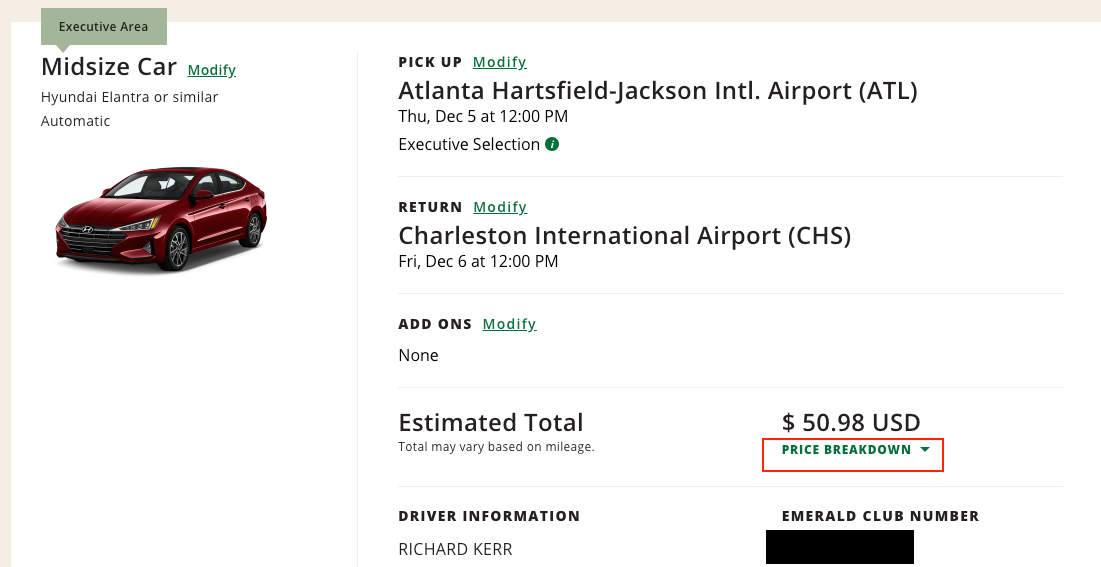
In the screenshot above you see the final checkout page for National car rental. Unless you click the price breakdown box, you won't know what mileage is included with your rental:
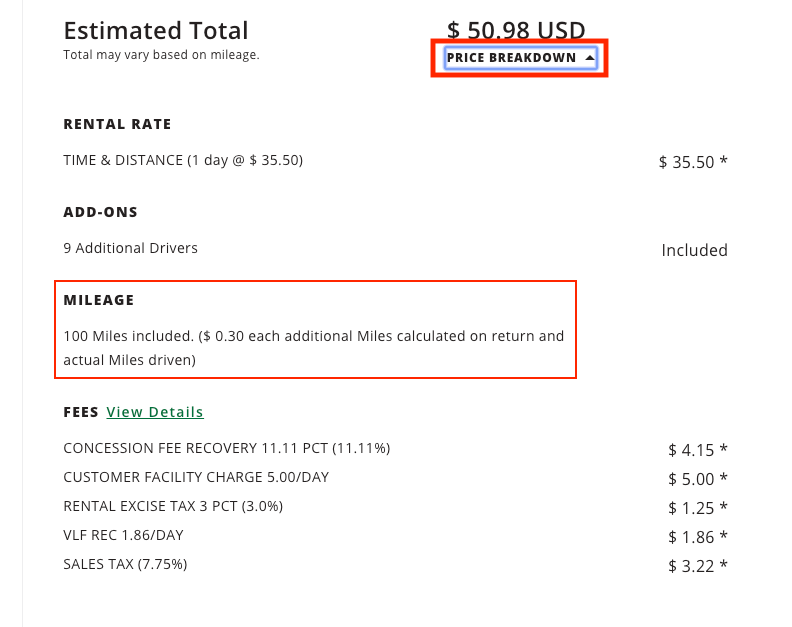
On this rental, only 100 miles are included; you'd then face an additional charge of 30 cents per mile after that. It's worth noting that the distance between Atlanta (ATL) and Charleston (CHS) is at least 300 miles, depending on the route you take. That's an additional charge of at least $60, more than doubling your cost.
You'll also see the variety of fees below the mileage which could be an entire (separate) discussion, but I'll just make this blanket statement: The fees for rental cars are really out of control, and beware of limited mileage requirements.
Automatic Toll Paying Programs
Headed to Florida or the Northeast? You're most likely going to be traveling on toll roads in your rental car, and they are almost unavoidable. To help you navigate these roads, rental car companies have ingenious toll programs that automatically bill the toll based on your rental's license plate or a box mounted on the windshield. The catch is that they charge you for this convenience, and this is usually an offensive amount (like $12 per day or $60 per week) — and even that doesn't include the actual toll itself.
To make matters worse, the ability to pay cash for tolls in some locations has disappeared entirely. This essentially forces you to be in possession of an EZ Pass or similar transponder to pay tolls. The rental car agencies are counting on this and then sell you their overpriced options to pay the tolls.

You basically have two choices to avoid these fees. First, avoid toll roads by updating the settings in Google Maps or Waze. Second, register and bring your own toll-payment transponder to cover these added costs. For example, a removable SunPass transponder in Florida costs $19.99 and will ship within 4-5 business days of placing your order.
Either way, do your research and see if you can still pay tolls with cash or if you need to prepare for the added cost of your rental.
Fee to Earn Frequent Flyer Miles
If you chose to earn frequent flyer miles instead of a rental car company's own points/credits, you are going to pay a small surcharge for that ability. Rental car companies have to buy the miles from the airline program and will happily pass along some of that cost to you. Certain companies are pretty good about disclosing this on their websites:
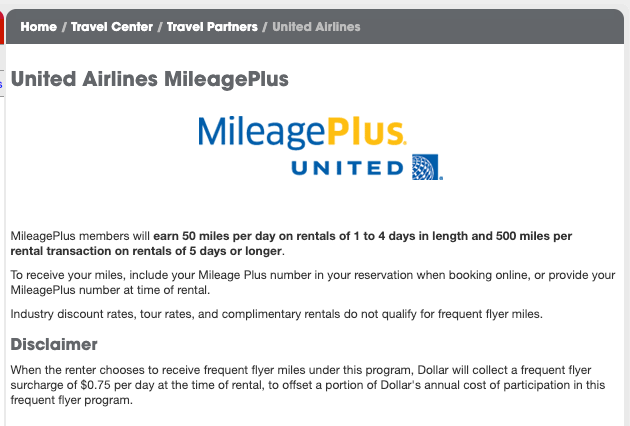
Others have disclaimers without the amount:
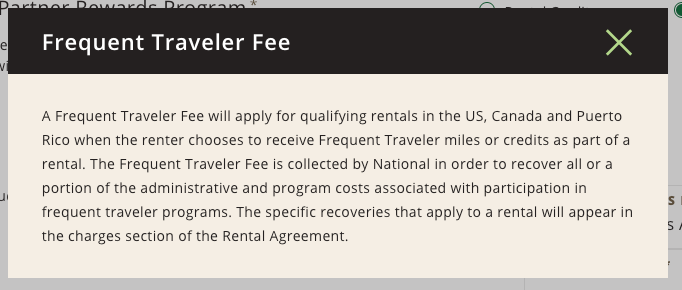
The fee is usually somewhere between 75 cents and $1.50 per rental day. I personally choose to earn rental car company points instead of airline miles, unless there is a really big promotion. The small cost isn't enough to sway me, but it is annoying, and the number of miles you earn is typically insignificant. I (personally) find that earning points or credits toward a free rental makes much more sense.
Prepaid Gas
If you have to pick up your car keys from a counter, you're going to hear the prepaid-gas up-sell every, single time. Unless you're told otherwise (like at non-airport Enterprise locations), you have to return a rental car with a full tank of gas. Otherwise, you'll be charged something crazy for the company to top it off for you.
To avoid this, most companies offer the convenient option of filling the tank for you — often referred to as a "fuel service option" or something similar. This allows you to skip the hassle of finding a gas station on your way back to the airport, and the company will fill the tank for you. You just need to prepay for the gas, and this may seem like a fantastic deal when you see it online:

However, this can be an expensive mistake. What you are actually paying for is an entire tank of gas for your rental car, whether you run it down to empty or not.There are plenty of rentals when I use less than a half of a tank of gas, and if you've done the prepaid option, you've paid for way more gas than you used. While the quoted price per gallon is attractive, returning a car on anything less than fumes probably results in a higher per-gallon cost than what you'd pay at stations outside the airport.
Finally, even if you decline this prepaid option, be sure to save your gas receipts in case you need to prove that you refilled the tank prior to returning your car.
Geographic Restrictions
This isn't a problem for the vast majority of rentals you'll complete, but if you are renting from a smaller, regional company, you need to be aware that there may be restrictions on where you can drive your rental car. This may be the case because the rental agency doesn't have support contracts for towing and maintenance support, but it could come back to bite you if things go wrong.
Sixt even publishes an entire chart of where you can and cannot operate the car your rented:
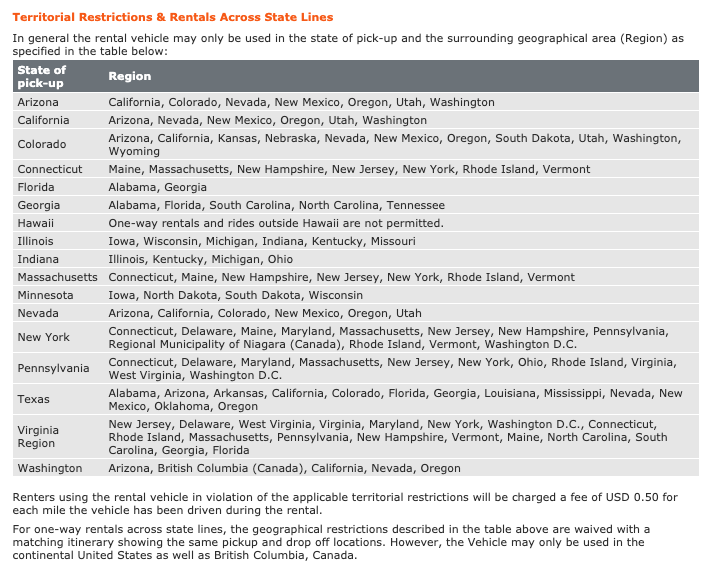
These can also come up if you've booked an open jaw in Europe and plan on driving your car across the border between two countries. Make sure that's allowed before you commit to your trip.
Insurance
Let me start with a blanket statement: Yes, you absolutely need some form of insurance when you rent a car. You just shouldn't buy it from the rental car company itself. The protections they offer are very overpriced and usually something you can get via your credit card (for damage waivers) or your personal car insurance (for liability coverage).
If you are going to use the coverage offered by your credit card, make sure it offers primary coverage and that you decline all options offered by the rental car company. Remember too that credit card coverage only covers damage or theft to the car, not liability, so you need that elsewhere if you are not going to purchase it from the car rental company.
Bottom Line
There are plenty of rental car horror stories and mistakes out there. If you think the rental process is as easy as selecting a car advertised at a single price, picking up the keys and heading out the door, you've got another thing coming. A one-way rental from Florida back north — through toll roads and with limited mileage — could result in you paying double or triple the price you thought you were paying.
You should also start every rental with a thorough inspection of the car you are going to take, and document any damage on a damage report form with the rental company before departing the location. This can come to the rescue if a company tries to claim that you were the cause of any damage to the vehicle.
Don't let rental car companies and their convoluted processes and policies trip you up. Do your homework before your next rental and make sure you have all of the above points addressed or known.
TPG featured card
at Capital One's secure site
Terms & restrictions apply. See rates & fees.
| 5X miles | Earn 5X miles on hotels, vacation rentals and rental cars booked through Capital One Travel |
| 2X miles | Earn unlimited 2X miles on every purchase, every day |
Pros
- Stellar welcome offer of 75,000 miles after spending $4,000 on purchases in the first three months from account opening. Plus, a $250 Capital One Travel credit to use in your first cardholder year upon account opening.
- You'll earn 2 miles per dollar on every purchase, which means you won't have to worry about memorizing bonus categories
- Rewards are versatile and can be redeemed for a statement credit or transferred to Capital One’s transfer partners
Cons
- Highest bonus-earning categories only on travel booked via Capital One Travel
- LIMITED-TIME OFFER: Enjoy $250 to use on Capital One Travel in your first cardholder year, plus earn 75,000 bonus miles once you spend $4,000 on purchases within the first 3 months from account opening - that’s equal to $1,000 in travel
- Earn unlimited 2X miles on every purchase, every day
- Earn 5X miles on hotels, vacation rentals and rental cars booked through Capital One Travel
- Miles won't expire for the life of the account and there's no limit to how many you can earn
- Receive up to a $120 credit for Global Entry or TSA PreCheck®
- Use your miles to get reimbursed for any travel purchase—or redeem by booking a trip through Capital One Travel
- Enjoy a $50 experience credit and other premium benefits with every hotel and vacation rental booked from the Lifestyle Collection
- Transfer your miles to your choice of 15+ travel loyalty programs
- Top rated mobile app


